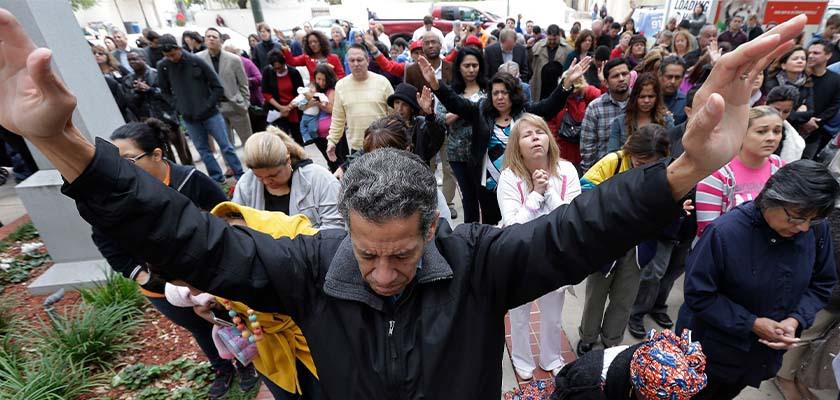Although the National Day of Prayer has been established as an official American tradition since 1952, the history runs far deeper.
The long-standing practice of hosting a national day of prayer falls on the first Thursday of May. Some may choose to partake in the tradition, while others may let it simply pass by. Nonetheless, many are unaware of the rich history the practice has in the American story.
Days of prayer and supplication were familiar to those in the British colonies. In fact, British law commanded the observation of many days of fasting and prayer.
Although collective days of prayer were observed locally in various American territories, cross-colony prayer first came into being when tensions between Great Britain and the American colonies were at critical mass.
In 1775, nearly one year before the Declaration of Independence was signed, the Continental Congress announced a day of prayer on Thursday, July 20, focusing on the continuing hostilities between the colonies and Great Britain. Prayer was to be offered for the king, as well as the oppressed colonies:
“…Thursday, the 20th day of July next, be observed by the inhabitants of all the English colonies on this continent, as a day of public humiliation, fasting and prayer that we may, with united hearts and voices…bless our rightful sovereign King George III, and inspire him with wisdom to discern and pursue the true interest of all his subjects, that is speedy and may be put to the civil discourse between Great Britain and the American colonies, without further effusion of blood.”
After war broke out, the tradition of having a cross-colony day of prayer continued throughout the Revolutionary War. The National Day of Prayer took a brief hiatus after the war, but President George Washington reinstituted the practice in the first year of his presidency.
On April 11, 1779, 10 years before he was president, George Washington echoed the call of the Continental Congress and instructed the colonial armies to set aside the 6th day of May as an occasion of prayer and fasting.
“… Congress having recommended it to the United States to set apart Thursday the 6th day of May next to be observed as a day of fasting, humiliation, and prayer, to acknowledge the gracious interpositions of Providence; to deprecate deserved punishment for our Sins and Ingratitude, to unitedly implore the Protection of Heaven; success to our Arms, and the Arms of our Ally: the Commander in Chief enjoins a religious observance of said day and directs the Chaplains to prepare discourses proper for the occasion; strictly forbidding all recreations and unnecessary labor,” Washington wrote in a letter to Colonel William Patterson.
Thanksgiving ceremonies were considered another day of prayer under British law and were held in the fall. Days of prayer in the spring were usually accompanied by fasting and supplication. It wasn’t until Abraham Lincoln that Thanksgiving was made into an official holiday celebrated in the fall.
Through the years, declaring a national day of prayer came in spurts, with some presidents engaging in the practice and others choosing to forgo it.
It wasn’t until 1952 that a bill was introduced, stating that the president of the United States was to set aside an appropriate day each year, other than Sunday, as a National Day of Prayer. President Harry S. Truman signed the bill into law, and the National Day of Prayer has been an annual practice for the U.S since.
Even though atheistic groups have had significant resistance to the National Day of Prayer, the National Day of Prayer organization (NDOP) maintains that the day is of paramount importance.
“The National Day of Prayer has great significance for us as a nation as it enables us to recall and to teach the way in which our founding fathers sought the wisdom of God when faced with critical decisions,” the NDOP website says. “It stands as a call for us to humbly come before God, seeking His guidance for our leaders and His grace upon us as a people. The unanimous passage of the bill establishing the National Day of Prayer as an annual event signifies that prayer is as important to our nation today as it was in the beginning.”
Although the day is observed across religious lines, the NDOP website maintains an explicitly Christian statement of faith.
Dr. Brandon Scroggins, a local pastor in Wetumpka, outlined the significance of national, corporate prayer amongst believers during turbulent cultural times.
“Throughout scripture, we see public calls for prayer over nations in tremendous need,” Scroggins said. “In the midst of national distress and disaster, Nehemiah cried out, 'O Lord, let your ear be attentive to the prayer of your servant, and to the prayer of your servants who delight to fear your name…' (Nehemiah 1:11). The nation had fallen into ruin, and there was a multitude of concerns to address. It’s striking, however, that the book of Nehemiah begins with a desperate plea of prayer before God. And in our own day, we have countless concerns before us, and action is needed to rebuild and restore the ruins. However, there is no other place to begin but with prayer. Prayer must be thoroughly threaded into the fabric of our daily lives, but there are also times to arise together corporately in prayer.
“May the National Day of Prayer be a time for us, beginning with individual families and churches across Alabama, to cast ourselves before the mercy of God- bringing adoration and praise to God for His many attributes and works, confessing our sins before our Holy God, thanking God for His graciousness in a thousand different ways, and praying through the many pressing concerns facing families, churches, civil magistrates, and communities across our great nation.”
To connect with the author of this story, or to comment, email craig.monger@1819news.com.
Don’t miss out! Subscribe to our newsletter and get our top stories every weekday morning.










